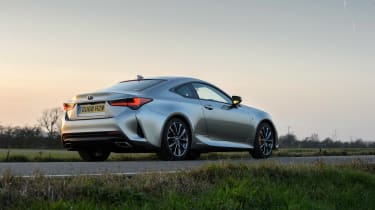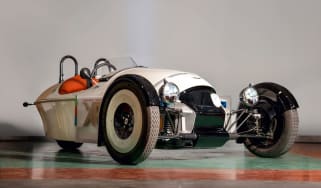Lexus RC 300h (2014-2020) review
The Lexus RC 300h was an unusual prospect – a hybrid coupe – but it was neither the best hybrid nor the best coupe you could buy
Pros
- Quiet long-distance cruiser
- Eye-catching styling
- Excellent build quality
Cons
- CVT gearbox makes engine noisy
- Not as fun to drive as you'd expect
- Cramped rear seats
| Car type | Fuel economy | CO2 emissions | 0-62mph |
|---|---|---|---|
| Hybrid | 44-46mpg | 141-146g/km | 8.6s |
Like most similar coupes at this price, the Lexus RC 300h was based on a saloon car – in this case, the Lexus IS. However, besides being another four-seater with dramatic styling, the RC stood out as being a hybrid coupe. Its natural rivals, the BMW 4 Series and Audi A5, didn't (and still don't) include a hybrid model in their line-ups. However, they're still rivals, particularly when you consider how economical the diesel-engined versions of those cars are.
The RC 300h is what Lexus calls a "self-charging hybrid". That means a small battery and a very short range on electric power only – just a mile or two, as opposed to the 30, 40 or even 50 miles you can get from some plug-in hybrids. Arguably, it makes the Lexus easier to live with, as you never need to plug it in to charge. But it also means the RC is nothing like as economical as a plug-in. Indeed, with claimed economy of less than 50mpg and CO2 emissions of 146g/km, it’s no more economical than a diesel-engined 4 Series or A5.
The RC came in two trim levels, but even the most basic – simply called RC – got 18-inch alloys, adaptive cruise control, lane-keeping assistance, automatic high-beams and traffic-sign recognition. F Sport cars boast a mesh grille, LED headlights, orange brake calipers and adaptive suspension.
The exterior styling may well be what sells this car to most buyers, but the interior is also very stylish. It’s also well built from some lovely materials, but if there's an issue, it’s that form has occasionally been allowed to overtake function. Some bits look great, but aren’t the easiest to use, with the touchpad controller for the infotainment system being perhaps the worst offender. While the RC caters very well for anyone in the front, this is some way from being the most practical coupe. Not only are the rear seats cramped, they’re awkward to get into, and the boot is smaller than in the car’s most obvious rivals.
As a driver's car, the RC also comes up short against its coupe rivals. Above all, the extra weight of the hybrid system and its batteries does the performance and handling no favours, so it’s neither as quick nor as sharp as a BMW 4 Series. And, when you want full acceleration, the CVT automatic gearbox sends the engine revs – and its noise – soaring uncomfortably. Where the RC is at its best is as a comfortable and relaxed tourer. Once you’re at a steady cruise, it’s beautifully quiet inside and the ride is smooth, despite the suspension being set up a little firmer than in the IS saloon.
For all that, the RC isn't that easy to recommend. If you’re looking for a hybrid, it’s not hard to find something more economical, even with a similarly prestigious badge. And if you want a sporty coupe, models like the Audi A5 and BMW 4 Series are much more rewarding to drive. Styling aside, the only reason you’d have an RC on your shortlist is if you must have a hybrid coupe. For a more detailed look at the Lexus RC 300h, read on for the rest of our in-depth review...



